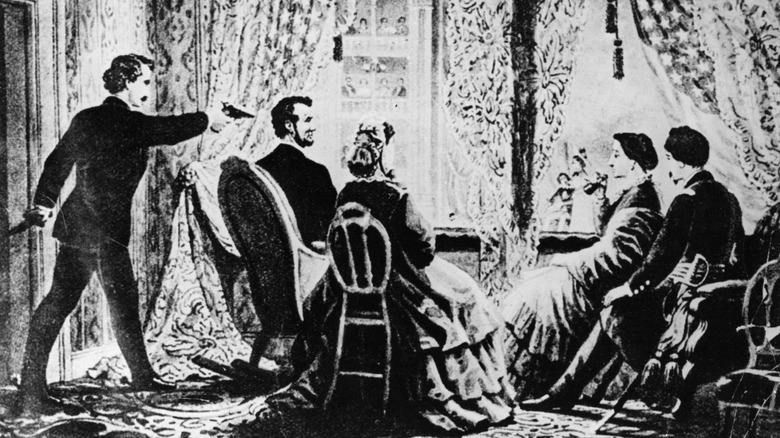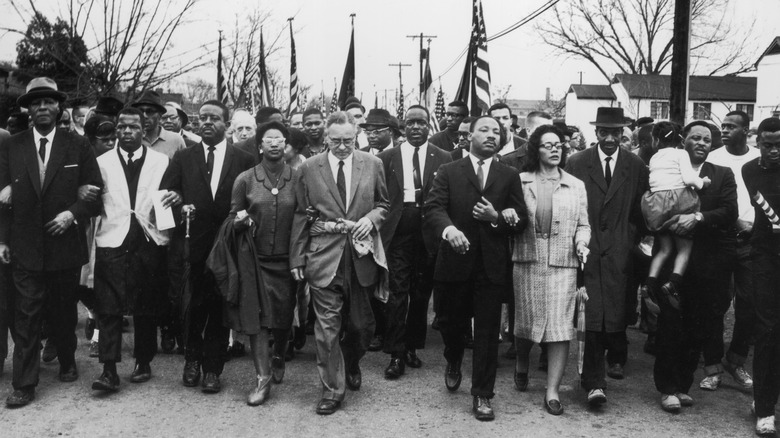What Might've Happened If Abraham Lincoln Survived His Assassination
Science fiction shows love using the alternate universe trope. What if Steve Rogers never became Captain America? What if Anakin Skywalker never turned to the dark side? And although it's difficult to fully imagine what an alternate universe could look like, we can still try.
One of the events some people would like an alternate universe of is the moment of Abraham Lincoln's death. What would have happened if Lincoln survived his assassination and the United States did not plunge into mourning? Indeed, historians and researchers have spent time figuring out this possible mirror universe to see if things really would've been different had Lincoln not died that fateful night.
Lincoln, who spearheaded the Union's fight against the Confederacy, was a controversial figure post-Civil War. He had enemies who disagreed with his methods, and many conspired to get rid of the president. Eventually, actor John Wilkes Booth did the deed.
Most people know the story: Lincoln attended a performance of the play "Our American Cousin" at the Ford's Theater on April 14, 1865. While the audience laughs at the actors onstage, Booth hides behind the presidential box before stepping into the region and shooting Lincoln in the back of his head. A scuffle ensues, and Booth jumps to the stage to escape. After being carried out of the theater, the president lives for a few more hours before succumbing to his wounds.
According to History Extra, if Lincoln survived, everything would've been different.
A smoother reconstruction
Some historians believe that had Lincoln not died, his second term would've enjoyed great success. CNN reported the Reconstruction era after the Civil War would still have been difficult — possibly even too much for the Abraham Lincoln White House to handle. But unlike his real-life successor, the unpopular Andrew Johnson, Lincoln had one thing going for him beyond his famous affability: sky-high popularity.
Despite grumblings from states that supported the Confederacy, Lincoln had the support of many Americans. He also had the respect of Southern lawmakers, wrote Live Science. He was at the height of his popularity when he won a second term, and his political party was in control of both chambers of Congress.
Lincoln also had enough political savvy to navigate the tricky waters of running a government after a war with itself. History Extra noted Lincoln was willing to compromise and was open to changing his views. Some historians believe his administration would've readmitted states that seceded but levied harsher punishment, such as removing Confederate leaders from positions of power. Johnson, himself a slave owner whose legacy many believe perpetuated white supremacy, was more conciliatory towards the secessionists. Lincoln didn't want Confederate leaders hanged, but he wanted them politically exiled.
Due to Johnson's pardoning of Confederate leaders, Southern states were allowed to enact Black Codes — laws that extremely limited the rights of freed Black men and women. Johnson's government let these slide; Lincoln likely wouldn't have.
But what about equal rights?
If Abraham Lincoln had lived and were allowed to remove Confederate officers from power, he would likely have pushed for legislation providing voting rights for Black people. According to CNN, it's likely the civil rights era of the 1960s would not need to exist had Lincoln gotten his way. Lincoln may have also pushed for more people to move out West and empowered freed slaves to build lives away from white Southerners. As a result, the West could've become centers of Black communities far earlier than it did today.
Nevertheless, this does not mean that the United States would suddenly be free of racism had Lincoln not died. As History Extra points out, the faults of Reconstruction brought about the 14th Amendment, which states that no law shall pass that infringes upon the right of any citizen of the United States. It is this amendment that formed the basis of the Civil Rights Movement — both in the 1960s and until this day. It provides federal cover to prevent states from creating laws without equal protection for everyone, and also recognized Black Americans as citizens.
The language of the 14th Amendment may have been different, or it may not have existed at all. If Lincoln oversaw Reconstruction, it is possible that it would've held back the fight for equal rights.
While conjecture is fun, one thing is for sure: If Lincoln didn't die, his reputation might not be as shining as it is today.


